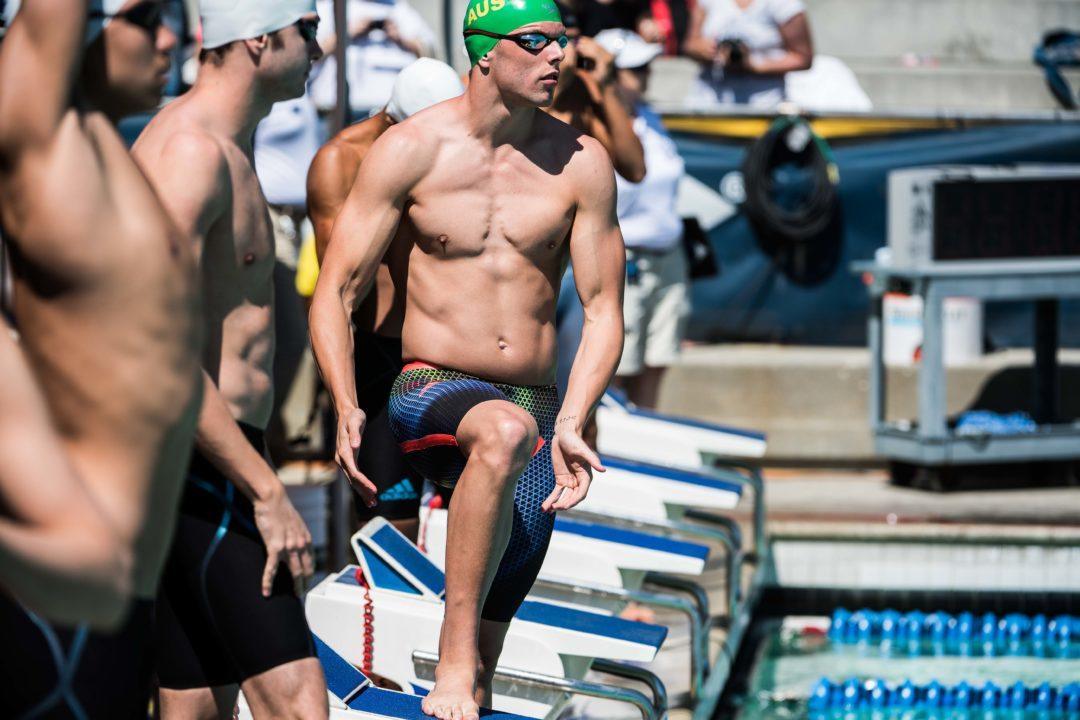2016 AUSTRALIAN SHORT COURSE SWIMMING CHAMPIONSHIPS
- Brisbane Aquatic Centre, Brisbane, Queensland
- Thursday, November 3rd – Saturday, November 5th
- Prelims 10am local (8pm Eastern night before)/Finals 6pm local (4am Eastern)
- Meet Preview
- Start Lists
- Live Results
After scoring a 5th seeded time of 47.91 in this morning’s heats of the men’s 100m freestyle in Brisbane, all eyes were on 100 LCM freestyle Olympic champion Kyle Chalmers to see what he’d throw down in the SCM final. But, the 18-year-old was forced to withdraw from the sprint freestyle event unexpectedly due to a sudden attack of Supraventricular tachycardia (SVT).
The swimming community is no stranger to SVT, seeing how Olympic gold medalist Rebecca Soni (USA) also suffered from the condition. The American would complain of a rapid heartbeat, sometimes clocked at 300 beats per minute. In 2006, the legendary breaststroker underwent a procedure called cardiac ablation to fix the issue. Doctors inserted electrical energy through a catheter to eliminate extraneous tissue in her heart that had been the root of the problem.
Chalmers was diagnosed with SVT before the 2016 Olympic Games and tonight withdrew from racing after having complained to coach Peter Bishop about a rapidly increasing heart rate. Swimming Australian Head Coach Jacco Verhaeren confirmed that, although Chalmers didn’t compete in the 100, the double World Junior Champion can indeed race the 200m freestyle slated for tomorrow.
“It is a condition that we have always been aware of and also of treatment that he has undergone,” said Verhaeren.
“It is something we knew about in the lead up to the Olympics and obviously we are guided by the doctors.
“It is something that is not a major heart condition but when it comes his heart rate escalates quickly.
“We will see how he is tomorrow and he may be able to race, we will have to wait and see.”
Naturally Chalmers was ‘devastated’ at not having the opportunity to challenge countrymate Cameron McEvoy for the 100m freestyle title. McEvoy would end up winning the event in a personal best and new All Comers Record time of 46.19.

Kyle “sun yang” Chalmers
Wow, sorry to hear that. This hits close home too. Our daughter and her coach noticed her heart goes up to 220 beats during a set, 3 weeks ago. We scaled training down until her app with a cardiologist next week. Just to check it out.
SVT is not as benign as the text mentions. An ex-NFL player, who suffered from a form of SVT for years (Wolff-Parkinson-White syndrome), and also had ablation to fix an extra electrical pathway in his heart, died 2 weeks ago in his sleep at age 30. Not saying off course it might happen to Kyle, but something I am sure they are aware off.
Hopefully it was just a one off and nothing to worry about, but definitely ask the cardiologist about the possibility of autonomic dysfunction (dysautonomia), which is dysfunction of the autonomic nerves which control things like heart rate, blood pressure, temperature, sweating, digestion etc. It is especially common in young women. Symptoms can include increased heart rate, dizziness, fatigue, sweating changes, problems with urination or digestion, feeling hot and cold frequenty, and color changes in the extremities. Treatment is available. Many doctors don’t consider it despite obvious symptoms, so missed or delayed diagnosis is common. I’m not sure if links are allowed in comments, so check out Dysautonomia International online if you want to know more. Hopefully your daughter’s appointment goes… Read more »
I should also add, that although a good cardiologist should be familiar with autonomic dysfunction and is often part of the treatment team, a neurologist specializing in autonomic dysfunction will also be needed. If the symptoms persist and a cardiologist doesn’t seem to help find a specialist neurologist and ask your daughter’s primary care provider for a referral .
Thanks for taking time to write about this. Good information. She has none of symptoms you mentioned. Good news is her heart beat at rest is normal and heart beat drop rate within 90 seconds from a tough set is fast and the beat is back to normal. Most likely, it is how her cardiovascular system “operates” but we will know more next week. Thanks again.